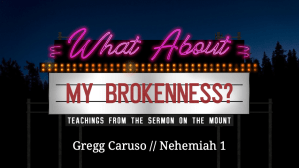This is a sermon I delivered at Moraga Valley Presbyterian Church on Sunday, Aug 22, 2021
If we haven’t met, my name is Gregg Caruso and I serve as a Managing Partner at VitalChurch Ministry and I also lead the Diagnostic Division. As such, I led the diagnostic process here at MVPC last summer, gave the initial oral report, and wrote the final report. I have heard good reports over the last year on how you are building on your numerous strengths and preparing for the upcoming permanent pastor search process. (I would just remind you of something I said in both the oral and written reports: The more you accomplish in this transition season, the higher caliber of pastor you will attract.)
As we saw in the bumper, we are in a series called The Grind, because sometimes life can be a grind, and last weekend Pastor Dave spoke on Parenting with Grace, and today we will be considering Parenting with Wisdom from Deuteronomy 6:4-12.
Before we read the passage together, just a bit more about me…Linda and I recently celebrated 43 years of marriage. We have four grown children and seven grandsons. Parenting is a big deal to me. Here’s why: Back in the ‘80’s, in one of my early seminary classes, the stated objective was for each person in the class to write a Life Purpose Statement along with a set of Personal Core Values. Here is what I wrote (shortened):
My life purpose is to continue to emerge as a father in the faith (1 John 2:12-14), believing that effective, reproducing fatherhood is the highest calling for a man in the body of Christ. As this relates to my immediate family, it is my intention to prayerfully and lovingly stimulate [them] to love God and honor God in all that they are, say, and do. As this relates to my ministry function, it is my intention to further expand the kingdom of God through leading, teaching, motivating, and mentoring leaders and potential leaders to fulfill their destinies in Christ.
Approximately 35 years later I can tell you that my Life Purpose remains the same. I am passionate about effective and reproducing fatherhood.
If you’re a parent, I probably don’t need to tell you that wise parenting is both the hardest and most rewarding job on the planet. And today, I would offer a special thank you to those of you who are adoptive parents and foster caregivers.
With this in mind, I’d like to read our text for this morning, Deut 6:4-12 (NASB): “
Hear, Israel! The Lord is our God, the Lord is one! 5 And you shall love the Lord your God with all your heart and with all your soul and with all your strength. 6 These words, which I am commanding you today, shall be on your heart. 7 And you shall repeat them diligently to your sons and speak of them when you sit in your house, when you walk on the road, when you lie down, and when you get up. 8 You shall also tie them as a sign to your hand, and they shall be as frontlets on your forehead. 9 You shall also write them on the doorposts of your house and on your gates. 10 “Then it shall come about when the Lord your God brings you into the land that He swore to your fathers, to Abraham, Isaac, and Jacob, to give you, great and splendid cities which you did not build, 11 and houses full of all good things which you did not fill, and carved cisterns which you did not carve out, vineyards and olive trees which you did not plant, and you eat and are satisfied, 12 be careful that you do not forget the Lord who brought you out of the land of Egypt, out of the house of slavery.”
[v. 7 – can appear to be sexist — the Hebrew word for sons is ‘ben’ and is used almost 5,000 times in the OT. About 140 of those times the word is used for children – both male and female.]
What’s significant about the book of Deuteronomy is that it records a series of sermons that Moses preached to the nation of Israel just before they entered the promised land. He’s coming to the end of his life, he’s raised his own children and essentially two generations of Israelites and he’s learned a few things about parenting and leadership. The essence of his final words to this generation is, “As you head into this promised land…this is what it means to follow God in your family, in your community, on the job, and in worship.” What he is essentially saying is, “all of this is connected to wise and proactive parenting.”
So, from our passage for today we will see (at least) three principles from Moses on how to parent with wisdom:
- There’s a truth to teach.
- There’s a way to live.
- There’s a story to tell.
Let’s look at them one at a time…
There’s a truth to teach.
Verses 4-5 are the basis for one of the most famous and important prayers contained in the Bible and one we see the Hebrew people repeat over and over again throughout the Old Testament. “Hear, Israel! The Lord is our God, the Lord is one! 5 And you shall love the Lord your God with all your heart and with all your soul and with all your strength.”
This prayer is called The Sh’ma, which is the Hebrew word for listen or hear. The word can also mean pay attention to or focus on. What’s important for us to understand is that the word and concept of Sh’ma means to both listen and obey. In ancient Hebrew there is no separate word for obey, meaning that, for them, hearing and doing are two sides of the same coin.
Many of you will recognize these words as part of what is referred to in the New Testament as the Great Commandment. In Mark 12 and Matthew 22, some legalistic religious people were seeking to trap Jesus by asking Him which was the greatest commandment (of 613!).
Jesus repeats the Sh’ma as the first and greatest commandment and then adds Leviticus. 19:18 as the second greatest commandment: “And you shall love your neighbor as yourself.”
The New Testament tells us that these two commandments sum up (or consolidate) the entire Old Testament: Love God and Love People.
Wise parenting (or grand-parenting, or god-parenting, or babysitting, or working in the Children’s or Student Ministry) means that, first and foremost, we seek to consistently model Loving God and Loving People.
Let’s quickly review how we get to a place where we CAN become increasingly consistent in Loving God and Loving People.
Some of us were raised in a church context where we were taught that obedience is the primary goal of the Christian life. This is incorrect. Loving God and Loving People is the primary goal of the Christian life. A good Presbyterian will know this…The first question of the Westminster Shorter Catechism is: “What is the chief end of humankind? The answer is: Our chief end is to glorify God, and to enjoy Him forever.”
So, how do we get there from here?
The Apostle John, who was the best friend of Jesus, states it succinctly in 1 John 4:19 that “We love because he first loved us” (emphasis added). You and I do not have enough willpower to make ourselves consistently obedient in Loving God (or Loving People). For the active intentional follower of Jesus, our obedience is not a fearful or legalistic striving to please God but a grateful and joyous response to the love He has already loved us with. God has welcomed and embraced us through the provision of the finished work of Jesus on the cross. God’s love made the first move.
This is the gospel, it’s not about what we do or don’t do, it’s about what God has already done for us IN and THROUGH Jesus Christ. As you and I surrender into that sacrificial love, God’s empowering presence begins to do IN us and THROUGH us what we could not do on our own – and we grow in our capacity to LOVE God.
Here are two application points…
- When we blow it, we need to own it. When you’re around your children (or anyone) and you blow it and act in a way that doesn’t reflect loving God or people, we need to own that and confess that (even with toddlers). I’m a reactor on a lifelong journey to become a responder.
- One of the best tools available is an app called New City Catechism. It’s an excellent family devotional and discipleship tool.
There’s a way to live.
There’s a Truth to Teach and There’s a Way to Live… Verses 6-9 provide us with two significant insights into how we are to live…
Verse 6 is interesting: “These words, which I am commanding you today, shall be on your heart.” Why ON our hearts and not IN our hearts? That’s the same question a student asked of his Hasidic rabbi. This is how the rabbi responded:
“When you study the Torah, it places Scripture on your heart, [because] only God can put Scripture inside your heart, and then when your heart breaks, the holy words will fall inside.”
Over the years I’ve heard hundreds of parents say, “I just want my kids to be happy.” No, you don’t. You want your kids to be joyful. There’s a big difference between happiness and Christian joy. The word happiness comes from the same root as the word happenstance. Happiness is circumstantial, it will come and go throughout our lives, but Christian joy is residential. Christian joy is not merely an emotion, it’s an inner state of being that is a gift from God (Rom 15:13), which grows in our inner being as we learn to continuously surrender to God’s love and care.
Heartbreak and suffering happen as a part of our maturation process. God doesn’t take us around heartbreak and suffering, He takes us through heartbreak and suffering. The good news is He goes with us. Job 42:5 has been on my heart for the last several years, “I have heard of You by the hearing of the ear; but now my eye sees You.” A contemporary paraphrase might be: I’ve known ABOUT You, but now I KNOW You. Or, as as Tim Keller has said: “We go from understanding to standing under.”
Then, as we consider a way to live, the keyword in verses 7-9 is found in v. 7, it’s the word diligently – “You shall teach them diligently…”
- NIV – “Impress them on your children…”
- Eugene Peterson’s The Message paraphrase gets it right when it says: “Get [God’s Words] inside of you and then get them inside your children…”
Most translations use the word diligently and the Hebrew word means, “to sharpen.” Again, it’s important for believers to note that we don’t sharpen or stay sharp in our parenting by reverting to willpower, legalism, or regimentation. It’s more about the outflow or overflow of our own worshipful relationship with God. John 7:38 tells us that out of our innermost being shall flow rivers of living water.
Here’s an important and wise parenting tip: Your kids are not going to do what you tell them to do. They’re going to do what you do.
By way of a possible application here… Linda and I raised our children with (only) two core values in mind that helped us make the bulk of our parenting decisions…
- We desired for our children to be tenderhearted before God and people.
- We desired our children to be learners (disciple means learner).
The implication of these values is that we paid more attention to heart issues than behavioral issues.
There’s a story to tell.
So, we have a truth to teach, we have a way to live, and finally, we have a story to tell…
In vs. 10-12 Moses is lovingly admonishing the people to remember and repeat their testimony of God’s amazing grace. They are about to take possession of the Promised Land with cities they didn’t build, houses full of all good things they did not fill, water wells they did not dig, vineyards and olive trees they did not plant, and then v. 12 says: “then watch yourself, that you do not forget the Lord who brought you from the land of Egypt, out of the house of slavery.”
These verses are a clear parallel to the New Testament salvation experience where God meets us in our captivity and His transforming and empowering grace liberates us to take possession of the life He has always planned for us.
I’d like for us to encounter a bit of Catholic author Brennan Manning’s story today. Brennan Manning struggled through alcoholism and divorce. He is probably best known for his book, Ragamuffin Gospel, but this (condensed) quote is from a subsequent book entitled, All Is Grace: A Ragamuffin Memoir:
“My life is a witness to vulgar grace – a grace that amazes as it offends…A grace that hikes up the robe and runs breakneck towards the prodigal reeking of sin and wraps him up and decides to throw a party no ifs, ands or buts…A grace that is the pleasure of the Father, fleshed out in the carpenter Messiah, Jesus Christ, who left His Father’s side not for heaven’s sake but for our sakes, yours and mine. This vulgar grace is indiscriminate compassion. It works without asking anything of us [except to acknowledge our sin condition] …[God’s] grace is sufficient even though we huff and puff with all our might to try to find something or someone it cannot cover. Grace is enough. He is enough. Jesus is enough.”[1]
The sincere followers of Jesus will have our own ongoing testimonies of God’s “vulgar” and incomprehensible grace. And if you don’t have a testimony of encountering God’s incomprehensible grace, I would invite you to ask God to show you, over the course of your life, where His grace has intervened – and as God’s intervening grace becomes clear to you, I would invite you to surrender your life and all it contains to the living God. This is how wise parenting begins.
In conclusion, I’d like to review the wise parenting tips that Linda and I have learned over decades of walking with God (sometimes stumbling with God), raising children, and pastoring people. And I will add one final tip…
- The most essential tip is to live and love and raise children as active intentional followers of the risen Savior, Jesus Christ.
- When you blow it, own it (even with toddlers).
- Join me in the lifelong journey of migrating from reacting to responding.
- Download the New City Catechism app.
- Remember that your kids are not going to do what you tell them to do. They’re going to do what you do.
- Be more intentional about dealing with heart issues than behavioral issues because behavior is the fruit of what’s occurring in the heart
My final and closing tip is to make attending church a priority. What’s happening in a worship service is a review and a restatement of the gospel that is designed to culminate in a (fresh) surrender to the gospel which our souls need every week. When church is optional, I believe we set up our kids to fail. The whole family needs to be refreshed in the gospel on a weekly basis.
Closing Benediction…
May the presence of God go with you, and give you rest (Exodus 33:14); Let your words as parents and caregivers be helpful for building up children according to their needs (Eph 4:29); and may God grant you, parents and caregivers, a wise heart, so that your words will be gracious like a honeycomb, bringing sweetness and health to your family and this church family (Proverbs 16:23-24). Go in peace.
[1] Brennan Manning. All Is Grace: A Ragamuffin Memoir, Multnomah 2005: 193-94.











